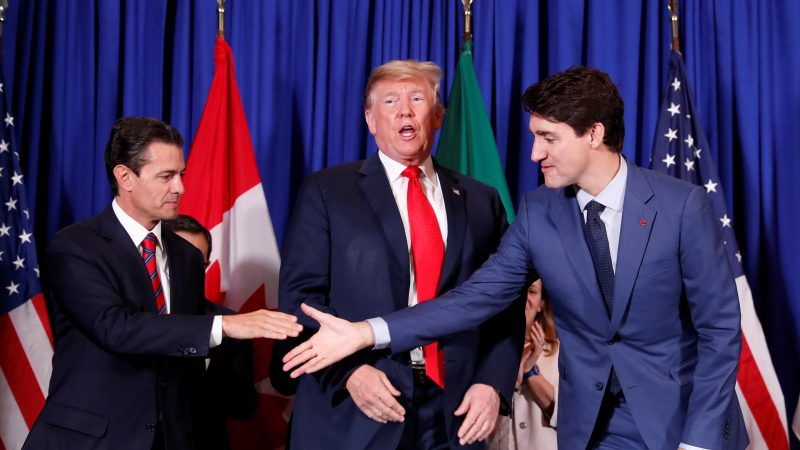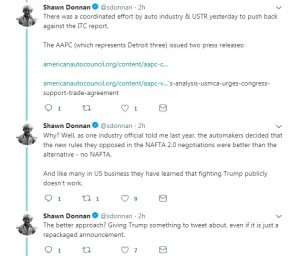New NAFTA Would Boost U.S. Economy, but Fewer Cars Would Be Built Here
And they'll cost more to buy

An independent analysis of President Donald Trump's ballyhooed rewrite of the North American Free Trade Agreement (NAFTA) projects that the new three-way trade deal would provide a boost to the U.S. economy but would result in the outsourcing of more automaking jobs.
Overall, though, the United States-Mexico-Canada Agreement (USMCA) is a modest, mild set of reforms—Trump has called NAFTA "one of the worst deals ever" but his proposed replacement is basically NAFTA 2.0, according to the estimates provided by the International Trade Commission (ITC) in a report released Thursday. The new report is unlikely to ease the USMCA's passage through Congress, where factions on both sides of the aisle remain skeptical about the merits of replacing the 26-year-old NAFTA.
The ITC report projects the USMCA would hike U.S. gross domestic product by $68.2 billion (0.35 percent) and U.S. employment by 176,000 jobs (0.12 percent). The U.S. would see gains in both imports and exports if the deal is ratified, the ITC estimates.
"Since NAFTA removed almost all tariff barriers, the gains from USMCA are modest and largely come from reductions in the remaining non-tariff barriers," writes Inu Manak a trade policy scholar for the libertarian Cato Institute.
Perhaps the most politically important part of the report focuses on how the new trade deal would affect automakers. The Trump administration pushed for the inclusion of stricter rules that make it more difficult for cars and car parts to cross national borders duty-free—something the administration believes would reverse the trend of automaking jobs moving to Mexico under NAFTA. Under the proposed new rules, 75 percent of the component parts of vehicles would have to be produced in North America, and 40 percent would have to be built by workers earning at least $16 an hour—effectively putting a minimum wage on Mexican manufacturing plants.
Instead of complying with the new regulations to trade duty-free, it's likely that carmakers would simply pay the higher tariffs and pass those costs along to consumers. As a result, the ITC report says, consumer prices on cars in the U.S. would increase, resulting in an estimated 140,000 fewer vehicles sold. Auto manufacturing jobs would decline by about 1,500.
Matt Blunt, president of the American Automotive Policy Council, a trade group, called the ITC analysis "flawed" in a statement issued Thursday.
"The report underestimates the longer-term investments and increased U.S. auto parts sourcing that will be made in our sector as a result of the certainty and predictability the USMCA will deliver," he said.
Previously, interest groups representing automakers and dealers had been skeptical about the NAFTA rewrite. Throwing support behind Trump's USMCA may be a political calculation—essentially, a bet that getting the USMCA through Congress is the best way to get the president to back away from his threats to tear-up NAFTA without a replacement, an outcome that would be disastrous for automakers and the rest of the U.S. economy.

There's something to be said for that promise of trade stability. Canada and Mexico are the two largest export markets for the United States, not to mention the second- and third-largest import markets.
It will now be up to Congress to weigh the modest gains and losses promised by the USMCA against the danger of not giving the president the win he seeks on trade. It's now clear that the NAFTA replacement won't dramatically alter the economic future of any of the three nations involved, but that doesn't mean Congress will shrug its shoulders and simply pass it.
"Donald Trump's NAFTA represents at best a minor update to NAFTA, which will offer only limited benefits to U.S. workers," said Sen. Ron Wyden (D–Ore.), the ranking Democrat on the Senate Finance Committee, which handles trade issues, in a statement. "The administration shouldn't squander the opportunity to lock in real, enforceable labor standards in Mexico." Democrats appear poised to oppose the USMCA on the grounds that it does not do enough to prevent moving jobs to Mexico—Speaker of the House Nancy Pelosi (D–Calif.) has said she will not hold a vote on the new trade deal until Mexico makes changes to its own labor policies.
But the deal is already too protectionist for other members of Congress, including a faction of Senate Republicans who oppose the new rules of origin for cars. In a statement released Thursday, Senate Finance Committee chairman Chuck Grassley (R–Iowa) was noncommittal about the USMCA. "I'm glad to see the report recognized USMCA's new economic benefits," Grassley said, promising a "thorough and thoughtful review" of the trade deal and ITC analysis.
The report, says Manak, "is unlikely to sway anyone in Congress from changing their already strongly held opinions on the agreement."
"If anything, the release of the ITC report clears the way for implementing legislation to come forward and the real battle for the passage of USMCA to begin."
Editor's Note: As of February 29, 2024, commenting privileges on reason.com posts are limited to Reason Plus subscribers. Past commenters are grandfathered in for a temporary period. Subscribe here to preserve your ability to comment. Your Reason Plus subscription also gives you an ad-free version of reason.com, along with full access to the digital edition and archives of Reason magazine. We request that comments be civil and on-topic. We do not moderate or assume any responsibility for comments, which are owned by the readers who post them. Comments do not represent the views of reason.com or Reason Foundation. We reserve the right to delete any comment and ban commenters for any reason at any time. Comments may only be edited within 5 minutes of posting. Report abuses.
Please to post comments


"Since NAFTA removed almost all tariff barriers, the gains from USMCA are modest and largely come from reductions in the remaining non-tariff barriers,"
So, it's better? Or worse, or what? I feel like this article is simply saying it's just a minor change, and so who gives a shit?
Some parts are better, others are worse, and both only slightly so. So its a wash
At least for automobiles, it's certainly more restrictive. So, if you believe in capitalism--that people in a free market are more efficient than central planning--it's hard to say this is "better."
And even then, it sounds like many automakers disagree for some reason or another.
It's just a weirdly representative thing for a lot of Trump coverage to me. Relatively standard actions are spun as monstrous or heroic. It degrades my ability to know what the hell is actually happening.
I don't know. I think I'm just whinging because I'm getting burned out on this shit.
I'm not saying it's the end of life as we know it. It's simply more restrictive for the automotive industry, and lower tariffs for other goods (it seems--I'm more familiar with the automotive industry impacts).
At the end of the day, it doesn't seem drastically different than NAFTA to me. Not significantly better or worse.
Another reminder that economically everything done by government force amounts to nothing more than forced transfer payment that can never net to any value greater than zero. It CAN net a value less than zero.
Attempts to favor domestic manufacturing companies and their employers and investors is only created by disfavoring consumers and other companies. There is not and never will be any proof that there is any overarching national interest in economically favoring one group over another.
It is very much picking one interest group over another... But I think math shows it is possible for the nation overall to win/lose, hence more or less be broadly better for all... The thing is, it's tough to pin down the right actions to take at the right time.
For instance the extreme amount of outsourcing we've had in recent decades has almost certainly left the USA poorer in total than we would have been if we'd saaay only lost half as many jobs to overseas... The loses were so large we effectively turned millions of people into welfare leaches vs productive members of society by shipping off their jobs, and I'm pretty confident that if one looked at the extra welfare costs, lost tax revenue, lost GDP, etc and compared it to the "savings" of outsourcing the jobs we've come out in the red overall. Effectively we did it to the point of no longer being at full employment, which is a part of the equation always left out of simplified free trade arguments, but is very real and important in a country with as much welfare/socialized costs as we have.
The thing is who knew it would be THIS BAD 20-30 years ago when a lot of the deals that caused this were being inked?
Given that our trading partners mostly just try to game the system, and we don't have real free trade, I'm of the mind minor tweaking course corrections as data comes in is perhaps the most realistic way to deal with it. We probably should have started turning the screws on China to open up in the mid 2000s after it became clear where that was gonna go. Mexico/Canada weren't really major problems anywhere along the line.
But whatevs. I'm in no position to do anything but bitch or theorize.
I don’t care what a trade deal does for “the economy” (whatever that means and as if that can really be measured) or what it does for the number of cars produced here or even what it does for car prices. Just tell me what it does for freedom of choice.
You can buy whatever you want, and pay some price for those things... Just like now.
Honda announced this morning that they're cutting US production.
Did they cite why? I would be highly skeptical that it has much to do with the USMCA as this point.
Looks like a response to lower demand for cars (Accords) as buyers shift to SUVs. Nothing new.
[…] New NAFTA Would Boost U.S. Economy, But Fewer Cars Would Be Built Here — And They’ll Cost More To Buy – Reason […]